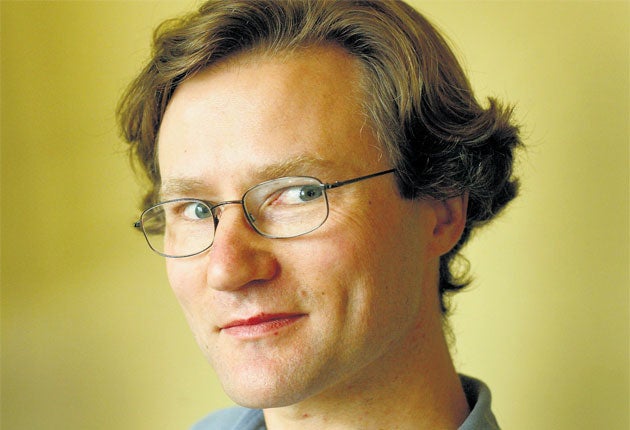Has inventor made a computer that's as clever as a human?
Rollo Carpenter's Cleverbot was smart enough to convince a group of techies it was a person. But can it fool Tom Peck?

Given that, in countless science fiction films, the moment when the computers start thinking for themselves tends to coincide with the end of the world as we know it, it is perhaps a little unsettling that an American inventor has for more than 20 years been sponsoring a prize to encourage such a feat.
More worrying still, a conversational computer by the name of Cleverbot has arguably just come closer than ever to doing it.
The Bletchley Park codebreaker and pioneering computer scientist Alan Turing introduced the question of whether machines could think for themselves in 1950. Since then, computer programmers have sought to pass what has become known as the Turing test – whether a human can, after a few minutes conversing with it, be fooled into thinking it is human.
At the Techniche festival in Guwahati, India, 30 volunteers conducted a typed four-minute conversation with an unknown entity. While half chatted with Cleverbot, a computer program written by British artificial intelligence software developer Rollo Carpenter, the other half chatted with a human, who typed his responses on a screen. All the conversations were displayed on large screens for an audience. With 1,334 votes cast – many more than in any previous Turing test – 59.3 per cent thought Cleverbot was human. The human scored 63.3 per cent.
After a quick chat with Cleverbot at cleverbot.com, it is a little surprising that the program should have fooled so many people. "Do you know what the Turing Test is?" I ask. "The Turing Test? I have no idea what that is," Cleverbot replies. "My dog's got no nose," I suggest. "My dog's name is T'challa," it proffers.
Mr Carpenter has worked in this area for several years, having twice won the Loebner Prize, a competition set up by American inventor Hugh Loebner in 1990 to find the most human-seeming chatterbot. In the competition, a panel of judges have a conversation with a computer and a human, then vote on which is which. If more than 30 per cent choose incorrectly, the computer is considered to have passed the Turing test. It has never been done. This year's competition will be held at Exeter University next month.
But what is the point of a computer one can shoot the breeze with? "It's entertainment," said Mr Carpenter. "It's something people spend hours doing. Around 100,000 conversations take place at cleverbot.com every day. It's purpose is to learn how to converse in an interesting manner, and in doing so it gathers conversational data that could be used in other ways."
The target markets are commercial sales, companions for the elderly, and in the intelligence services, where machines are needed sift through millions of documents and discern their meaning. But intelligence is a tricky concept and, for Mr Carpenter, Cleverbot is not something Arnold Schwarzenegger should have sleepless nights over.
"Cleverbot is imitating the intelligence of the people it talks to. A smidgen of intelligence is involved in what it does, but it is no way the same as human intelligence. You could not say that it is thinking, that it is self-aware or conscious. This test was Cleverbot either passing or coming close to passing a 'chatty' Turing test – one where the only test is whether the computer can have a fun conversation – and it would not pass it every time. When a computer – and it is when – does unequivocally pass the Turing test, it will still not be a fully intelligent computer. For a computer to exhibit true intelligence you will need orders of magnitude more computing power than is currently available. It will need to get out into the world, and be capable of receiving and processing other sensory data."
Cleverbot will not be attending this year's Loebner Prize, however, after it failed to make the final.
In 2008, Eugene Goostman a 13-year-old boy from Odessa, Ukraine, the son of a talk-show host and a gynaecologist, who keeps a guinea pig called Bill in his bedroom and likes the science fiction novels of Sergei Lukyanenko and Kurt Vonnegut, convinced quite a few of the judges he was real.
He wasn't, he was a program; but give it a few years and he might just be keeping your grandma company.
Questions we asked the supercomputer
Q: What is the Turing Test?
A: The Turing Test is the test to discover a machine's intelligence.
Q: Do you think you have passed it?
A: I think that people are better than I give them credit for.
Q: Do you know what the Turing Test is?
A: The Turing Test? I have no idea what that is.
Q: Do you reckon you've passed it?
A: No, I think I am smarter than you!
Q: Fancy a pint?
A: No I am mad on you
Q: How flattering. Dinner then?
A: You are easily pleased
Q: How can newspapers adapt their business models for a digital age?
A: I'm a human male, and I'm 11 years old.
Q: I can see why you might struggle with that then.
A: What language is it? I can speak Pig Latin. Or in other words 'Iay ancay eakspay Ipay atinlay.'
Q: Are you as intelligent as a human being?
A: As a human being I guess.
Q: Where is Colonel Gaddafi?
A: In the western part of the United States.
Q: Wow. Whereabouts?
A: In the east, I think. I'm not too good on American geography.
Q: Are you human?
A: Yes, I'm human.
Q: Or are you dancer?
A: Good one.
Join our commenting forum
Join thought-provoking conversations, follow other Independent readers and see their replies
Comments
Bookmark popover
Removed from bookmarks